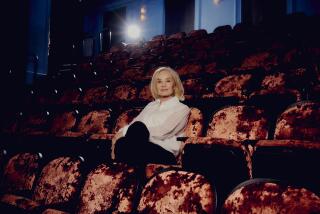STAGE REVIEW : Phobics Bare Their Souls in ‘Naked Dancing’
- Share via
The action Walter and Sarah Curtin are taking seems cruel at first glance, leaving their agoraphobic daughter Annie alone in the house without food, without light, without a phone. They’ll force her into the world outside the front door at any cost.
Agoraphobia by definition is an unreasoning fear of open space or crowds but, in John Banach’s “Naked Dancing” at the Colony Studio Theatre, the Curtins are convinced it’s just Annie’s stubbornness.
They really can’t be blamed. They’re not the most intellectually aware couple (she sits at a sewing machine in a factory). Their taste, according to Ramsey Avery’s excellent indicative setting, runs to Durer’s “Praying Hands,” bad commercial landscapes and cheap commemorative plates.
Besides, they’re only a hook to get Annie alone in the house with her fear and loneliness. That’s when the play really begins. It ignites with the insistent knocking on the door three days later.
The intruder in her little shell of a world says he’s the son of Mrs. Curtin’s forewoman, just checking to see if she’s all right. Frank is loud, pushy, brash and won’t take no for an answer, but he’s a charmer. Lights? Simple. Just put a penny in the fuse box; he’ll stop at the store later. He’ll bring food too. And his ghetto blaster, and reggae and Broadway show tapes. And the trumpet he played in high school. And his guarded affection and overzealous romanticism.
In a quirky, engrossing performance, Mike Michaud as Frank comes close to stealing the show from the delicate, sensitive Annie of Kristina Coggins. He’s not quite what he says he is, and he lets the audience know that without giving away his real story.
Anyone who’s wrestled with a debilitating phobia knows about the walls Annie’s built around herself, but they’re no higher or wider than Frank’s. How they help each other into the open is the point of Banach’s shell game and, under director Jules Aaron’s deft guidance, the gradual peeling away of the layers of their insecurities is seamless and affecting. This is the only moment in time they will belong to each other, but it is totally theirs.
While Irene Roseen’s mother is touchingly ineffectual in dealing with Annie’s problems, the one-note obstinance of Joseph Sordetto’s father could be filled out with more detail to indicate some affection for his daughter. But these two characters, seen only at the beginning and end, are really superfluous to the core of the play. The technical details are among the Colony’s best, including Jamie McAllister’s intricate lighting, Kevin Dunayer’s sound and Maria Wortham’s costumes, which are so right the actors look as though they’ve lived in them forever.
At 1944 Riverside Drive; Thursdays through Saturdays, 8 p.m.; Sundays, 7 p.m.; ends March 11. Tickets: $15-$17; (213) 665-3011.
More to Read
The biggest entertainment stories
Get our big stories about Hollywood, film, television, music, arts, culture and more right in your inbox as soon as they publish.
You may occasionally receive promotional content from the Los Angeles Times.










